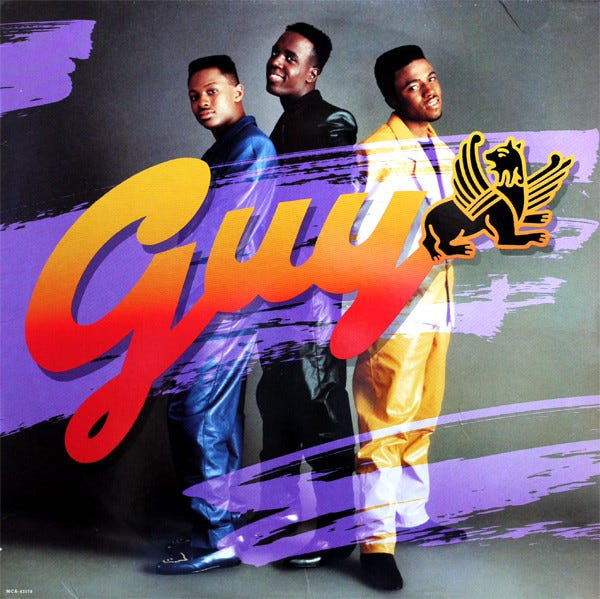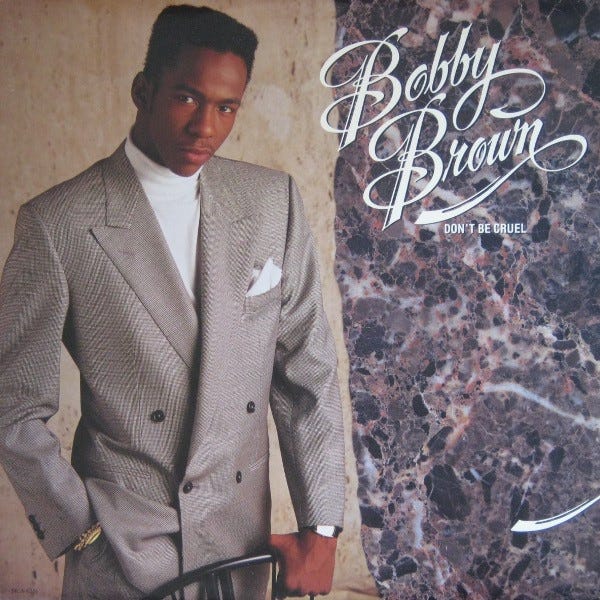The big bang: Guy and Don’t Be Cruel
A pair of albums covered in Teddy Riley’s fingerprints helped New Jack Swing explode in 1988


Teddy Riley had a hand in the two biggest R&B albums of 1989, both of which were released in June of ‘88, and both of which influenced the directions of both R&B and pop music for years to come. His own group’s self-titled debut, Guy, finished ‘89 at the year’s #1 R&B album, with Bobby Brown’s Don’t Be Cruel just behind it at #2. Cruel was the year’s #1 pop album, too, whereas Guy only reached #27 on the pop chart. And really, no one saw the seismic impact of either record coming.
Maybe we should’ve, though. Not only had Riley’s production of Johnny Kemp’s “Just Got Paid” already been an R&B (#1) and pop (#10) smash earlier in the year (think of it as Riley’s warm-up), but he also co-produced four, and co-wrote six, of the eight tracks on Keith Sweat’s 1987 debut Make It Last Forever, including the instantly iconic “I Want Her” (#1 pop/#3 R&B). Reviewing Sweat’s album for his Village Voice Consumer Guide, Robert Christgau said, “the beats prove Teddy Riley New York's answer to Jam & Lewis,” and he was right. But he was also more. “Paid” and “Want” were, effectively, the first two hints that New Jack Swing was going to be the Next Big Thing in R&B, and eventually pop, music.
Riley only touched two tracks on Don’t Be Cruel, to be fair; most of that album’s magic, notably most of its singles (the title track, “Every Little Step,” and slow jams “Roni” and “Rock Witcha”) was thanks to then-rising super-producers L.A. Reid & Babyface. But one of the two tracks Riley produced and co-wrote was Brown’s sole #1 pop single, which I think 35 years later, it’s fair to call “legendary”: “My Prerogative,” co-written by Brown, Riley, and Guy’s lead singer Aaron Hall. More on Hall momentarily.
Whereas Brown was still mostly a squeaky-clean teen idol on 1986’s King of Stage, his first post-New Edition solo record, on Don’t Be Cruel, he took a slightly more aggressive tack, showing himself to now be a man living according to his own prerogatives. Lead single “Cruel” was a way to ease into it, but from the first hard, dry thrust of “My Prerogative” to the defiance of its lyrics and the pelvic thrusts Brown spotlighted in its video, this was clearly no longer the same teen dream we’d met on “Candy Girl” and “Mr. Telephone Man.” On the spoken bridge near song’s end, he even shouted out his collaborator while staking his claim - “I made this money, you didn’t! Right Ted[dy Riley]? We outta here!” With a single song, Brown remade his image and career, with the assist of Riley, who was laying a further blueprint for the next several years of R&B and pop — the latter is often a few years behind the sonic innovations of Black music. (L.A. & ‘Face, and Jam & Lewis, clearly took some notes: see the harder rhythms on Janet Jackson’s Rhythm Nation 1814.)
Where Don’t Be Cruel trails off, figuratively and literally, is its final trio of tracks, none of which has L.A. & Babyface’s, or Riley’s, involvement. They’re just average, a disappointing way to end an album which, for its first two-thirds, feels like such a statement of intent. But thanks to what comes before, it’ll always be rightfully known. You can’t say the same for Riley’s own Guy, however, which slams hard from start to finish, thanks in no small part to his own hand; he at least co-penned with fellow Guy member Hall and original member Timmy Gatling, and co-produced with manager Gene Griffin, every song here.
That said, Riley doesn’t deserve all the credit. Guy, and Guy, would’ve been nowhere near what they were if not for the devastating lead vocals of Aaron Hall. His voice was big and commanding, akin to the Gap Band’s Charlie Wilson - he didn’t plead with you, but instead told you to love him, told you what he liked, told you to, well, groove him.
And Riley knew how to best couch Hall’s voice, from the jumpier, insistent textures of “Groove Me” to the smooth, creamy R&B of “I Like.” The latter was the album’s fourth single and biggest smash, a #2 R&B hit which helped push the album, finally, to the top of the R&B chart. As for the ballads, that’s where Hall could really let loose, wailing away; interestingly, none were released as singles from Guy, but “Piece of My Love” anecdotally received substantial R&B radio airplay as an album cut, and can still be heard from time to time in Quiet Storm programming.
Guy is, to my ears, a perfect R&B album, encompassing all of the flavors of male-led music in the genre in the late ‘80s; Riley even spends much of “Spend the Night” rapping, presaging his early ‘90s group Wreckx-N-Effect. Don’t Be Cruel isn’t quite as successful as an album, but boy oh boy do those singles - and there were five of them! - go hard. Neither would exist without Teddy Riley, a true master craftsman of R&B - and to think that arguably the two most important records in which he had a hand came out in the same month. What a time it was.
[Originally written for Rock and Roll Globe in June 2023.]


